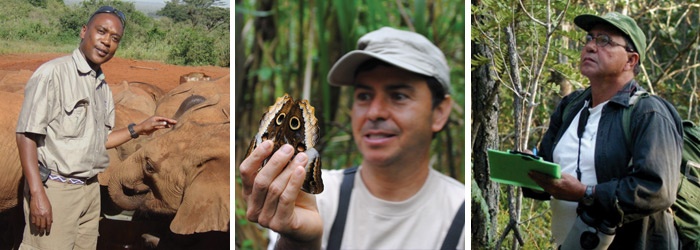An Inside Look into Guide Training
Whether you are exploring diverse wildlife on safari in Tanzania, hiking the Inca trail to Machu Picchu or scoping out target species on the Selva Verde Reserve, the quality of your guide makes all the difference—which is why Holbrook prides itself on hiring expert, local guides through a careful course of selection and training.
We spoke with Pelin Karaca, Holbrook’s Vice President of Program Development, to get an inside look into Holbrook’s process for selecting and training guides.
Overview of the Selection Process
What qualities do you look for when selecting guides?
In addition to being native to the country and a licensed guide, we look for individuals with leadership qualities, and specific personality types. “Knowledge can be learned and gained with experience; personality is [intrinsic] and often times more important than knowledge,” says Pelin. We strive for a balance between character and experience when making selections. These are a number of the qualities we look for when hiring new guides:
-
confidence—ability to lead and direct groups effectively
-
critical thinking skills—ability to make connections between bits of information as well as make sound decisions in difficult circumstances
-
communication skills—ability to relay information, instructions effectually
-
inquisitive—a thirst for knowledge, a desire to learn
-
fun-loving lively spirit—passion for the job and their country, and ability to have fun and laugh
-
knowledge—knowledge of regional, national and global current events
-
empathy—sensitivity to others feeling and needs
-
trustworthy—the know and do what is right
-
teachable—a willingness and desire to learn new skills
-
bilingual—ability to communicate in English as well as the native language of their country
How do you find new guides to work with Holbrook?
Because the selection process is so specific, there isn’t one exact method we employ to acquire new guides. Most of our referrals will come from word of mouth, such as from our partners in country whom we work closely with and are familiar with our programs’ needs. Often times they have access to contacts in country and in turn provide Holbrook with names of potential new guides. Holbrook also receives direct requests through the website from individuals expressing interest, as well as requests through partner organizations like Road Scholar. We also do some recruiting—in our travels if we come across a person we see has potential, we’ll approach them in regards to future possibilities.
Are guides’ expertise matched with the (special) interest of the group they lead?
Yes. A leader’s expertise plays a major role in the programs that they lead. Our goal is to get to know each guide personally, which allows us to adequately match each individual to the program that would benefit most from their strengths. Most of our guides are so well-versed in the culture, geography and customs of their country; therefore they are appropriate for a variety of tours. The only exceptions are specialty programs including birding, photography and garden tours. For these programs, the process is more involved and we work in conjunction with the guides in country and the (client) leader of a particular group to determine expert guide selection for each particular group. Overall, the process is customized and adaptable to meet the needs of each groups’ itinerary.
Training
What kind of training is required to be a Holbrook guide?
The details of each training session vary dependent on the destination (country), but the foundation is the same. All guides receive one-on-one training with Holbrook staff to learn about expectations, procedures and protocols. In addition, there is a yearly 5-day training conference led by Holbrook, typically held in Central or South America. The conference includes in depth workshops, lectures, exercises and more all designed to train new and existing guides. Pelin provided us with a copy of this year’s agenda for reference and it is certainly thorough. The program involves one-on-one exercises, role play activities, interactive exercises, a lecture on the history and mission of Holbrook Travel, information of emergency protocol and even a presentation from a guest psychologist on topics, which include: communication, body language, handling challenging situations, and empathy.
Lastly, the website says guides are “trained to deal with the unexpected,” can you elaborate on what that means?
Anything and everything that might come up during the trip—from small impingements to larger itinerary deviations, guides are prepared to deal with unpredictable conditions. This may look like maneuvering around road closures in a city or town, participant illness during a trip, unanticipated dietary restrictions of group members, unknown physical limitations of program participants, unexpected amounts of rainfall affecting group activities—the list goes on.
“The most important thing is that we are a team—Holbrook, in country partners and our guides.” The operation is successful because we support each other and all share the same primary goal: to ensure that our participants have the best experience possible. This is why outstanding guide selection and training is one of Holbrook’s main priorities.


